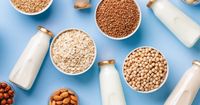Milk has been a staple in human diets for centuries, serving as a crucial source of calcium, protein, and other vitamins and minerals. However, not all individuals can consume dairy milk due to allergies, dietary restrictions, or personal preferences. Enter high protein non-dairy milk, an increasingly popular alternative that provides a nutritious boost for those looking to maintain a healthy diet without including dairy milk.
In this comprehensive guide, we will explore the various types of high protein non-dairy milk available on the market, their nutritional profiles, and the benefits of incorporating them into a vegan or lactose-intolerant diet. Whether you're a dedicated vegan or someone who simply wants to enjoy a delicious, protein-rich milk alternative, this guide has got you covered.
Types of High Protein Non-Dairy Milk
1. Pea Milk
Pea milk is a plant-based milk made from yellow split peas. It contains high-quality protein, making it a great option for individuals looking to include more plant-based proteins in their diet. Pea milk is also known for its neutral taste and ability to be easily incorporates into a wide range of dishes.
2. Soy Milk
Soy milk is made from soybeans and is one of the most widely-known vegan milk options. It contains eight grams of complete plant-based protein per cup and is often used as a substitute for cream in coffee and on top of cereal. Soy milk is also high in antioxidants and fiber, making it a nutritious choice for those looking for a healthy boost.
3. Oat Milk
Oat milk is made from a mixture of oats and water and is naturally sweet and mild in flavor. It contains three to four grams of protein per cup and is also rich in fiber and beta-glucan, which can help lower cholesterol levels. Oat milk is a great option for those who want to enjoy a creamy texture while also enjoying the health benefits associated with a high-fiber diet.
4. Almond Milk
Almond milk is made from whole almonds or almond butter and water. It has a light, sweet, and nutty flavor and is low in calories, fat, and carbohydrates. While it provides a modest amount of plant protein per serving, it is important to note that it also contains phytic acid, which can limit the absorption of iron, zinc, and calcium.
5. Cashew Milk
Cashew milk is made from a mixture of cashew nuts or cashew butter and water. It is rich and creamy with a sweet and subtle nutty flavor. Cashew milk is a great option for those looking for a lower-calorie, lower-carbohydrate milk alternative that is still flavorful and enjoyable.
6. Flax Milk
Flax milk is made from ground flaxseeds and is typically characterized by a slightly grassy and nutty flavor. It contains little fiber but is a good source of omega-3 fatty acids, making it a great option for those looking for a healthy脂肪 boost. Flax milk is also a good source of plant-based omega-3s, which have been linked to improved cognitive function and reduced inflammation.
7. Rice Milk
Rice milk is made by blending rice with water. It is often lower in calories than other milk alternatives and contains a higher glycemic index, which means it absorbs quickly in the gut. Rice milk also contains considerable less protein and fat than other non-dairy milk alternatives but is still a good option for those who are looking to diversify their diet and include more whole grains.
8. Peanut Milk
Peanut milk is made from peanuts and has a creamy and rich taste with a high protein content. It is also known for being a cost-effective option and providing a creamy texture that can be particularly enjoyable in smoothies. While peanuts themselves are a good source of protein, this option may come with higher calorie counts and fats than other protein-rich milk alternatives.
9. Hemp Milk
Hemp milk is made from the seeds of the hemp plant, Cannabis sativa, and is a good source of omega-3 fatty acids and protein. It can also be used as a dairy-free substitute for dairy milk in smoothies and desserts. Hemp milk is naturally low in sugars and carbohydrates and is a good choice for those looking for a high-quality protein and healthy fat source.
Benefits of High Protein Non-Dairy Milk
Besides providing a high level of protein, high protein non-dairy milk also offers a range of nutritional benefits. They are generally free from lactose and casein, which can make them a better option for people with lactose intolerance or cow's milk protein allergies. They also tend to contain fewer calories and less saturated fat than dairy milk, making them a more heart-healthy choice.
Moreover, many high protein non-dairy milks are also fortified with essential vitamins and minerals, such as calcium, vitamin D, and B12. This can help individuals who do not consume dairy milk to meet their nutritional needs.
Conclusion
High protein non-dairy milk has gained popularity in recent years as a health-conscious alternative to dairy milk. Whether you're a vegan, looking to reduce your saturated fat intake,或者 just trying to diversify your diet, these milks offer an excellent source of high-quality protein and other essential nutrients. When choosing a high protein non-dairy milk, it's important to consider factors such as calorie content, macronutrient profiles,添加剂, and potential health risks before making a decision on which one to incorporate into your diet.







